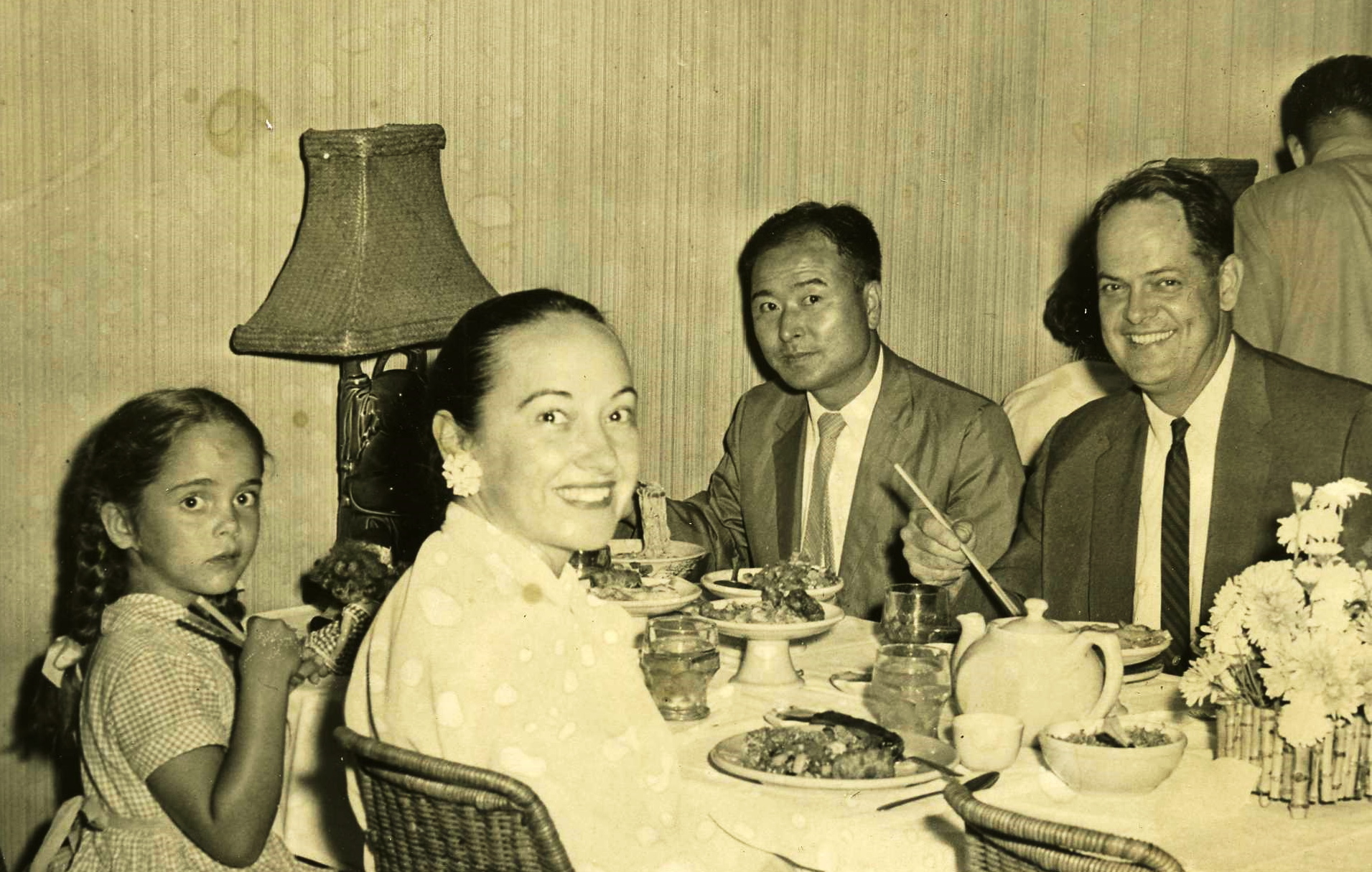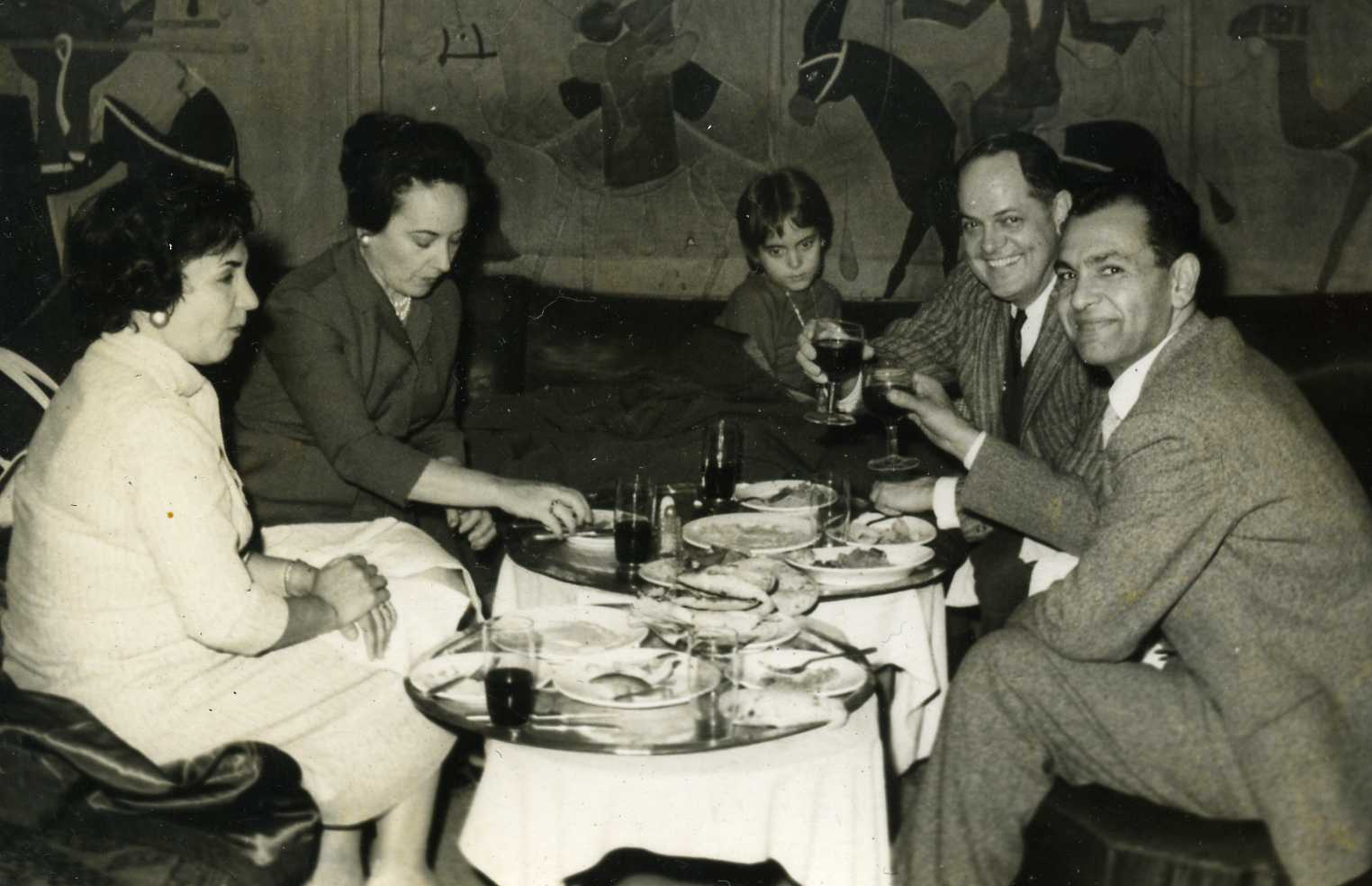
When my mother married at 19, dropping out of Erskine College to elope with my six-years-older father, she did not know how to break an egg.
All his life, my father -- very gently -- would tell the story of that first egg, cracked on the side of the stove, its golden yolk traveling, more and more slowly, down the spotless white enamel, all the way to the floor.
Faced with a fresh, unplucked chicken, circa 1936, my mother went out into the street and called in the first older woman she saw: "Please," she pleaded, holding out the fowl in a rubber-gloved hand. "What do I do next?"
She'd grown up in a family of sisters old enough to be her mothers, and with Grandmother Abalena, and Aunts Inez and Willie Sue already holding forth in the Townville, South Carolina, kitchen (with its wood-fired, pot-bellied stove, shelves and shelves of Mason jars filled with chow-chow and peach preserves, its enormous bread trough and Shaker sugar canister), there was no room for a wisp of a girl.
Instead, my mother became Townville High's valedictorian, learned to play the piano and sing jazz standards... and exited Stage Left for college; then, California, and Europe.
Elegant enough for Hollywood, my parents chose instead a life of service, fundraisers, TV series on the family and marriage, and seeming childlessness. What they ate in the 13 years before my unexpected arrival, I can only imagine: the dinners of my childhood, when my mother cooked them, were uninspired, bland, and horrifically 1950s-West-Coast-American. I remember encouraging the blue jays to steal my scrambled-eggs-and-brains and toasted Roman Meal bread (we usually had breakfast in the garden). Dinners? Minute steaks, Cream of Wheat, and endless, dull salads.
About halfway through the 1950s, thank God, my father took a cookery course at Pasadena's Buddhist Temple, studying under the emperor's summer chef... and largely took over our feeding. His social work students, Koreans and Middle-Easterners studying at USC and Occidental, had free rein in our kitchen as well. Someone gave me my first, child-sized, silver chopsticks when I was five.
And then, when I was nine, we left for Europe, a Greek woman from Smyrna took over the kitchen in Athens, Greece... and my mother finally learned to cook: French sauces, Turkish stews, lamb roasted with fresh artichoke hearts or broad beans, and chicken in herbs and wine.
Having come to gourmet cuisine so late in life, she never thought to teach her daughter who, it is true, by that time, was head-over-heels in love with books and uninterested in much of anything but freezer-tray ice cream (no other sort was edible in 1960s Greece, where no milk in Attica was pasteurized), wiener schnitzel and Greek salads. Oh, I did, also, like octopus and kalamari, but those were never prepared at home when the teeming sea was so close by.
At about this same time, my mother began collecting cookbooks. And though, for some ineffable reason, I have been giving them away pall-mall over the past two years (to friends who actually cook), I have kept her (many) favorites and, more important, all the letters, photographs, recipes, newspaper clippings and memorabilia tucked by her between the books' pages.
Here, just for example, I have a page of quarto-sized, onion-skin stationary headed "Le Grand Hotel Paris, Place de l'Opera, 12, Boulevard des Capucines." It is addressed, on one side, simply: "Mrs Herring," the cursive produced by a non-native-speaker (oh, those French r's, those Greek e's!). On the other is a recipe, typed, for peanut butter fudge. The instructions follow:
1 box of 4X sugar; 1 small can of Pet milk. Cook in double boiler until it forms a soft ball. 1 pint of peanut butter; 1 T of marshmallow whip. Fold into first mixture and beat until creamy. Cut in squares after pouring on greased marble or pan. Mrs. Herring from Florence Byrne.
I do not remember a Florence Byrne. Peanut butter and marshmallow whip were unobtainable in Europe in the early 1960s. My mother never, ever made or ate peanut butter fudge. But there the recipe is, tucked between the pages of a French cookbook, along with recipes for Miss Rose's English Apple Pie and Mildred Davis's Good Fudge.
Perhaps Mildred Davis had a not-so-good fudge recipe as well? We shall never know.

The Herring family, "China Town," Los Angeles, c. 1955
My mother's favorite cookbooks -- and I know which ones they were, because she read them till they fell apart though, as far as I know, never actually much "cooked from them," I have kept.
One is titled Chafing Dish Cookbook, by Helen Davis Brown, published in 1950 by The Ward Ritchie Press of Los Angeles. (I suspect my mother bought a chafing dish -- I have it, still -- to accompany this cookbook and another, titled Wick and Lick: A Gazette of Chafing Dish Specialties, by Ruth Chier Rosen. However, all I can ever recall her making in it, at a meal's end, was Cherries Jubilee, flambé, with good California brandy.)
My mother left a newspaper clipping tucked between pages 38 ("Crab Meat with Rum Rabbit") and 39 ("Currie Anything"). On page 38, there's also a quote from Lord Byron: "There's naught, no doubt,/so much the spirit calms,/As rum and true religion."
The news clipping, cut from Anderson South Carolina's Daily Mail, Monday, Aug. 31, 1959, was probably written by my Great Aunt Johnnie Price and is titled, "Late Summer Tea Fetes Mrs. James Burriss Pruitt, Jr." The event was held in the Calhoun Hotel Ballroom, attended by 500 (including my maternal grandmother, the Ur-Cook of the Boleman clan). Newspaper copy will never read this way again, thank heaven: "Mrs. Pruitt, Jr. was attired in her wedding gown of Swiss organdy embroidered with daisies and she carried a Chantilly lace fan adorned with miniature white roses, tuberoses and lily of the valley." Aunt Johnnie was very good on flowers, but we have no earthly idea what the 500 actually ate.

In Cairo with a former Vanderbilt classmate of my father's
Another favorite cookbook -- and this one did get some use, once Mother had spent three years under the tutelage of our Smyrna-born cook, Maria -- was The Sunset Cookbook: Food With a Gourmet Touch, edited by Sunset Magazine's Annabel Post, et al.
It was given her by her much older sister -- one of the three allowed inside the kitchen back in Townville -- Willie Sue Boleman Webb, whom we all knew as "Aunt Bill." The inscription, "Beth, I love you -- Bill, Christmas 1964" would baffle all who do not know what it is to be named something like "Willie Sue" and call yourself "Bill," instead.
Between the pages of this book are treasures -- letters and greeting cards, to my mother, from family and friends; love letters from my father; recipes -- such as one for cherry cake, hand-written on Mammoth Mountain Inn stationary, to Beth, from "Ro." It was 1964, my family had returned from Europe and were living in Chicago: I have no earthly idea who "Ro" was, but she and my mother were close. Cheek-by-jowl with that cherry cake recipe is The Two-Week Mayo Diet: the times they were a'changin.'
Just inside The Art of Eating: The Collected Gastronomical Works of M.F.K. Fisher -- and, remember, my mother was, first of all, a reader, and only second, reluctantly and late, a cook -- there is a two-page clipping from the glossy New York Times magazine, "Style & Entertaining," an article by Jacob Epstein titled "Revel With A Cause," its subject M.F.K. Fisher. The piece opens:
"Midway through the 1930's--what Auden called that 'low dishonest decade,' when the civilized world was working itself up yet again for one of its paroxysms of self-destruction--the American food writer M.F.K. Fisher, then in her 20's, left her professor husband in Dijon, France, and the prospect of afternoons in a brown satin dress nibbling on marshmallow salad with other faculty wives, to pursue a relationship with a friend she had fallen head over heels in love with, an artist named Dillwyn Parrish. In the articles she wrote about their love affair, she calls him Chexbres--Basque, I presume, for 'goat'--and leaves it to readers to imagine why."
Farther into this book, my mother has marked a chapter titled "The Measure of My Powers: 1919" with a letter. It is the only chapter marked in the book and its subject is a beautiful, slender, elegant actress, a "gourmande," who "loves to cook rich hot lavish meals." Her daughter, aged 8 or 9, absolutely hates her mother's cooking, however, and will only consent to eat at all when sent to her grandmother's, where she gorges on ice cream and mashed potatoes.
My mother died in 1992 but, oh, she can still reach out to me: "The Measure of My Powers: 1919" is a lovely gothic tale a la Isaak Dinesen, and I won't spoil the ending for you, but do look it up.
I have also kept my mother's Greek cookbooks, her Good Housekeeping Cookbook and first edition of The Joy of Cooking, all stuffed with recipes, clippings from hometown and exotic newspapers, and letters. I leave the inserts where I find them, as where I find them is part and parcel of their "message." Like notes in fragrant bottles, they tell me so much about the woman who was, almost coincidentally, my mother.
The Sunset Cook Book of Favorite Recipes, published in 1961 in California, bears a note, in pencil, in my mother's perfect cursive: "Odd--I bought this book in London, England--small world."
On page 321 is one of the simple recipes my mother pulled out every year at Thanksgiving, for pumpkin chiffon pie, with a gingersnap crust. I make it still.
When I abandoned America, and most things American, and high-tailed it back to Europe with my own version of Chexbres -- fulfilling, along the way, myriad unfulfilled dreams of my mother -- she would send me, at great expense, boxes of gingersnaps several times a year.
I believe I have read most of her messages in bottles, and taken them to heart. I, too, have turned out to be a mediocre cook (even when I try), the daughter of a mediocre cook, but my mother "nourished" me, and nourishes me, still, though long gone. I rifle through her cookbooks, find their paper hearts still alive, and recall M.F.K. Fisher's words: "It seems to me that our three basic needs, for food and security and love, are so mixed and mingled and entwined that we cannot straightly think of one without the others. So it happens that when I write of hunger, I am really writing about love and the hunger for it, and warmth and the love of it and the hunger for it... and then the warmth and richness and fine reality of hunger satisfied... and it is all one."